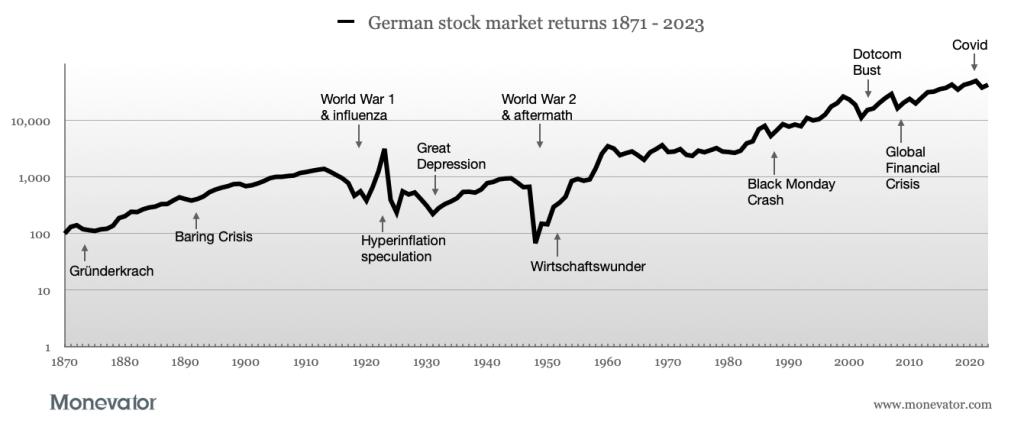
What caught my eye this week.
Long-time readers will know that bankers are not good with money. They love to lend money on overpriced assets in the good times. They become fearful when stuff is actually cheap.
Some of the most terrible corporate deals of all-time were driven by bankers.
And many – perhaps the majority – of financial blow-ups occur after a useful innovation that works at a small scale on the fringes is pumped-up with banker steroids, made into a ‘product’, and then inflated until it breaks.
As for investing chops, one of my most financially successful acquaintances is a banker. And for maybe 20 years he only ever invested in bonds.
(I’m not sure what he does nowadays. I suspect his salary alone has taken him into the eight-figure club, which may be why I don’t get candid insights anymore when I happen to run into him.)
True, my acquaintance didn’t need to take equity risk, given he worked in finance and was going to make his nut from a paycheque anyway.
Except… whenever I spoke to him about investing in the stock market he used words like ‘punting’ and ‘casino’. Yet he still became a global president of some bank division or another.
He’s by all accounts (including more than one governments’) an excellent financier, so I guess he’s one of the good ones. The history of The City and Wall Street shows many others are clearly… less adept. At least assuming you think fiduciary duty should be in the job description somewhere.
Of course lots of us are slightly rubbish at our jobs. But most of us don’t still make six to seven-figures from them.
Our man inside
I admit my banker diatribe may be a little dated. Because thanks to the financial crisis, nobody really believes all bankers are rocket scientists anymore.
Outside of the US at least, most banks have been lousy investments for over a decade. Regulation put in to curb their excesses has proven that most bankers aren’t actually very good at generating profits unless they use a boatload of other people’s money to do it. They are nobody’s infallible masters of the universe these days. Except perhaps their spouses.
Indeed I even read an article in the Financial Times this week hinting that bankers themselves have gotten more realistic about their abilities.
Admittedly it was written by a banker from the world’s best bank – JP Morgan, which even I’ve occasionally invested in because it’s so classy – and as the FT writer notes, the author, Jan Loeys…
“…writes about investment strategy in a way that can sound like a subtle dig at how the other 239,999 [JP Morgan employees] choose to spend their days…”
But seriously, these strategy notes from Mr. Loeys sound like a treat.
In them he stresses that you can build a great long-term portfolio from just two asset classes – shares and bonds. Loeys also believes that most excess returns from alternative assets either never existed or have been arbitraged away.
So buy a world tracker and government bonds, he says.
Now I know what you’re thinking. Surely this guy reads Monevator?
Because he is preaching the gospel of passive investing:
The danger is that many of us tend to overrate our ability to call the market short term. It is our perception that the most successful investors over time tend to be the ones that base their decisions on what they can be quite confident about, which is generally the yield/value of an asset or asset class and its historical long-term relative performance.
Hence, a “realistic” individual investor is in our mind probably best off sticking with long-term value-based allocation and to ignore the temptation to trade the market on short-term beliefs.
The general perception that “retail” tends to buy high, after a market has rallied for some time, and sell low, after that asset class has gone through severe losses, would be consistent with many of us overrating our trading skills.
Ironic, isn’t it? Go to an egregiously-paid banker – or maybe read a blog instead (and consider becoming a Monevator member so we can make at least a healthy five-figures!)
Simply the best
Way back in 2010, Andrew Haldane, then in charge of financial stability at the Bank of England, asked if the contribution of the massively-expanded financial sector was a “miracle or a mirage”.
It’s fun to think that 13 years later, my new favourite banker can himself write:
Our industry does seem to love complexity and to abhor simplicity. The more complex the financial world is seen to be, the more managers, analysts, traders, consultants, regulators, and risk managers feel they add value and expect to be paid.
But there is a lot of benefit to the ultimate buyers of financial services and products to keep things simple.
Amen sir.
Do read the FT Alphaville piece, which includes links to Loeys’ LinkedIn videos, too.
And have a great weekend!
P.S. For those bankers among our subscribers, I didn’t mean you silly. I meant those other bankers, those ones standing over there thinking up acronyms…
From Monevator
What’s the deal with Monzo Investments? – Monevator
Reducing lifetime portfolio risk with leveraged ETFs – Monevator [Mogul members]
From the archive-ator: five lessons from my frugal dad about money – Monevator
News
Note: Some links are Google search results – in PC/desktop view click through to read the article. Try privacy/incognito mode to avoid cookies. Consider subscribing to sites you visit a lot.
Mortgage approvals slumped to six-month low in August – Yahoo Finance
Energy bills forecast to rise in January to £1,996 – BBC
UK facing permanently higher taxes, says IFS – BBC
Meta pays £149m to break lease on central London office building – Guardian
Developers ordered to demolish ‘mutant’ tower blocks in Woolwich – BBC
More than 1 million children in UK sleep on floor or share bed, study finds – Guardian
UK economy grew faster than estimated since Covid – BBC
A fund manager is shelling out $269 million to buy and rejuvenate a clandestine network of tunnels under London – Insider
How UK inheritance tax compares internationally [Search result] – FT
Products and services
Coventry BS launches best buy easy-access savings rate of 5.2% – This Is Money
Dilemma for Muslim homebuyers compelled to pay high prices for loans – Guardian
Open an account with low-cost platform InvestEngine via our link and get £25 when you invest at least £100 (T&Cs apply. Capital at risk) – InvestEngine
Average five-year mortgage rate falls back below 6% – Guardian
Is now the time to fix your savings rate? – Which
Open a SIPP with Interactive Investor and claim £100 to £3,000 in cashback. Terms apply – Interactive Investor
Surge in market-leading mortgage deals charging fees – Which
HSBC to allow international credit history for credit card applications – Which
Homes with amazing kitchens, in pictures – Guardian
Comment and opinion
How to make Isas even nicer [Search result] – FT
Best investments to own during a recession – Morningstar
How to outperform – A Wealth of Common Sense
Taking a good thing too far – Mr Stingy
A half a century later – Humble Dollar
Housing bubbles around the world – A Wealth of Common Sense
Morgan Housel on the new way we think about money [Podcast] – Odd Lots
Everything you can’t predict – Young Money
Le rêve est mort? – Quietly Saving
How sequence-of-return inflation risk impacts retirees [Deep] – Kitces
Why luck isn’t real – Of Dollars and Data
Treat alternatives like cuisines, not like distinct assets – Integrating Investor
Work/life balance mini-special
UK over-50s on switching to part-time work – Guardian
The career arc of the practical creator – More To That
“It is futile”: young Britons swap career-driven lives for family and fun – Guardian
Bill Ackman’s unusual concession to hybrid working – Yahoo Finance
Overrun with oversharing: LinkedIn has gotten weird – Business Insider
Naughty corner: Active antics
My experience with LTCM points to a key lesson for investors [Search result] – FT
It’s too soon to say the value premium is dead – Morningstar
Risks but potential rewards remain in private company investing [Search result] – FT
The curse of short-termism – Behavioural Investment
Who buys sin stocks? – Klement on Investing
Kindle book bargains
Quit: Knowing When To Walk Away by Annie Duke – £0.99 on Kindle
How to Read Numbers by Tom Chivers – £0.99 on Kindle
Freakonomics by Steven D. Levitt – £1.99 on Kindle
Creativity Inc. by Ed Catmull – £0.99 on Kindle
Environmental factors
Microplastics in clouds could be contributing to climate change – Sky
‘Supercontinent’ could make the Earth uninhabitable in 250m years – Guardian
Scientists will unleash an army of crabs to save Florida’s dying reefs… – Guardian
Undermining ESG may be working, but it’s ultimately irrelevant – CAIA
Robot overlord roundup
DALL-E 3 is here – OpenAI
AI-generated naked child images shock a Spanish town – BBC
Amazon makes multi-billion dollar AI bet with Anthropic – Axios
The Panopticon is already here – The Atlantic
Off our beat
How astronomer Thomas Kepler solved the marriage problem – Big Think
The tyranny of the marginal user – Nothing Human
Why do economists get paid more than sociologists? – Noahpinion
Facing Covid, US lawmakers made the least worst choice – The Big Picture
The Norwegian secret: friluftsliv boosts health and happiness – Guardian
Can you trust happiness studies? [Podcast] – Art of Manliness
I’m still thinking about the Roman Empire. We all should be – Fatherly
Are we losing the war on cancer? – The Walrus [h/t Abnormal Returns]
Anti-vaxxers are now a modern political force – Politico
And finally…
“Every evening I would close my eyes in a quiet place in my apartment … I would visualize the opening and walk myself through the day and imagine the different emotional states the market would go through… Then when you get there, you are ready for it. You have been there before.”
– Paul Tudor Jones, quoted in More Money Than God
Like these links? Subscribe to get them every Friday. Note this article includes affiliate links, such as from Amazon and Interactive Investor.
The post Weekend reading: you can bank on this appeared first on Monevator.



